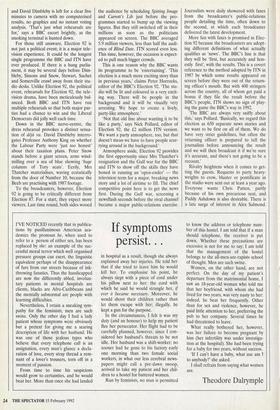If symptoms persist. . .
I'VE NOTICED recently that in publica- tions by pusillanimous American aca- demics the pronoun he, when used to refer to a person of either sex, has been replaced by she: an example of the suc- cessful moral terror which well organised pressure groups can exert, the linguistic equivalent perhaps of the disappearance of furs from our streets because of ink- throwing fanatics. Thus the handicapped are now the differently abled, involun- tary patients in mental hospitals are clients, blacks are Afro-Caribbeans and the mentally subnormal are people with learning difficulties.
Nevertheless, I retain a sneaking sym- pathy for the feminists; men are such swine. Only the other day I had a lady patient whose symptoms were obviously but a pretext for giving me a searing description of life with her husband. He was one of those jealous types who believe that every telephone call is an assignation, every man's glance a decla- ration of love, every stray thread a rem- nant of a lover's trousers, torn off in a moment of passion.
From time to time his suspicions would grow to certainties, and he would beat her. More than once she had landed
in hospital as a result, though she always explained away her injuries. He told her that if she tried to leave him he would kill her. To emphasise his point, he always slept with a piece of cord under his pillow next to her: the cord with which he said he would strangle her, if ever it became necessary. Moreover, he would shoot their children rather than let them escape with her; illegally, he kept a gun for the purpose.
In the circumstances, I felt it was my duty (and an honour) to help my patient flee her persecutor. Her flight had to be carefully planned, however, since I con- sidered her husband's threats to be not idle. Her husband was a shift-worker; no sooner had he gone to his factory early one morning than two female social workers, in what our less cerebral news- papers might call a pre-dawn swoop, arrived to take my patient and her chil- dren to a hostel for battered women.
Run by feminists, no man is permitted to know the address or telephone num- ber of this hostel. I am told that if a man should telephone, the receiver is put down. Whether these precautions are excessive is not for me to say; I am told that the management of the hostel belongs to the all-men-are-rapists school of thought. Men are such swine.
Women, on the other hand, are not perfect. On the day of my patient's departure from the matrimonial home, I saw an 18-year-old woman who told me that her boyfriend, with whom she had lived for two years, was very nasty to her: indeed, he beat her frequently. Other than for sex and violence, however, he paid little attention to her, preferring the pub to her company. Several times he had threatened to leave.
What really bothered her, however, was her failure to become pregnant by him (her infertility was under investiga- tion at the hospital). She had been trying for a baby for two years, without success.
'If I can't have a baby, what use am I to anybody?' she asked.
I shall refrain from saying what women are.
Theodore Dalrymple


























































 Previous page
Previous page